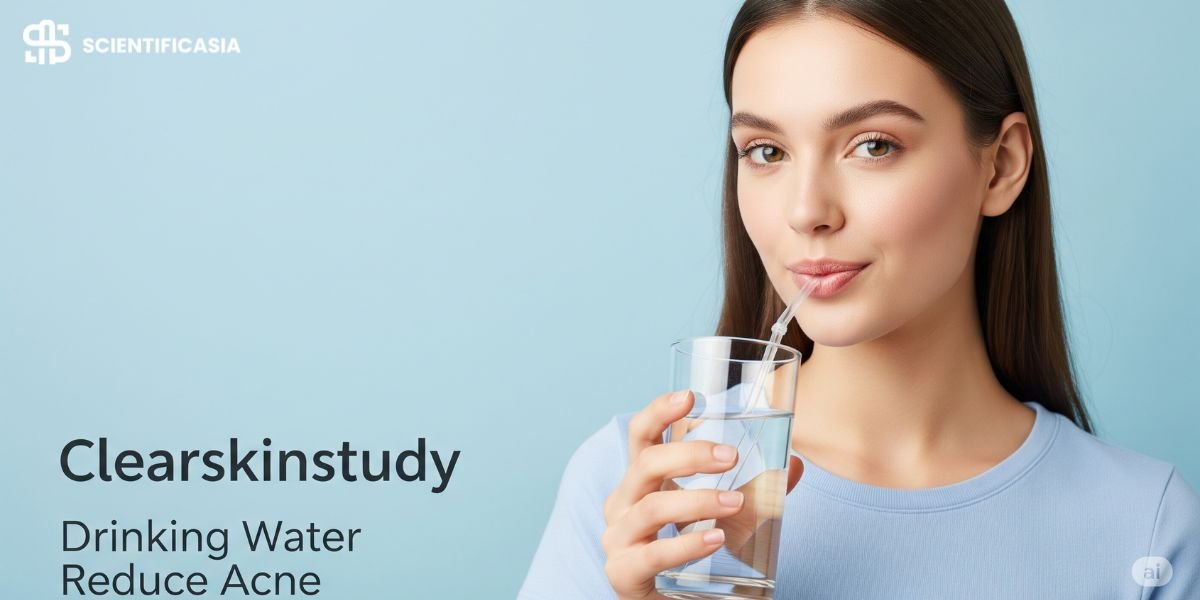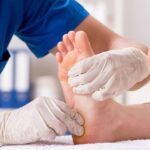Introduction
“Drink more water for clear skin!” You’ve probably heard this advice a hundred times, from well-meaning friends, beauty bloggers, and even some health gurus. The idea that simply upping your water intake can lead to a flawless complexion, especially when battling stubborn acne, is incredibly popular. But is it true? Is water truly the secret weapon against breakouts, or is it just another piece of well-intentioned, but perhaps oversimplified, health advice?
In this article, we’re going to dive deep into this common belief. We’ll explore what the science says, look at how water might (or might not) influence your skin, and examine if there’s any real research, like a “clear skin study,” that backs up these claims. So, let’s get to the bottom of it: Can drinking water truly reduce acne, or is it just one tiny piece of a much larger and more complex puzzle when it comes to achieving clear skin?
Understanding Acne: The Basics
Before we talk about water, let’s quickly understand what we’re up against. Acne isn’t just a random zit; it’s a common skin condition that happens when your hair follicles get clogged.
- What Causes Acne? It usually starts with an overproduction of oil, called sebum, from your skin’s glands. This excess oil, along with dead skin cells, can clog your pores. Once clogged, bacteria (specifically P. acnes) that normally live on your skin can multiply inside these blocked pores, leading to inflammation, which is why pimples look red and swollen. Hormones also play a significant role, especially during puberty, menstruation, and other life stages.
- Common Myths and Facts about Acne Triggers: You might have heard that eating chocolate or greasy foods directly causes acne. While diet can influence skin health, these specific claims are largely myths. Acne is far more complex than just what you eat in one sitting.
The “ClearSkinStudy” Explained: Fact or Concept?
When we talk about a “ClearSkinStudy,” it’s important to clarify what we mean. Is there one specific, famous research project with that exact name that definitively proves water cures acne? Not really, at least not widely recognized in scientific circles.
Instead, “ClearSkinStudy” often serves as a conceptual idea – a way to think about evidence-based approaches to achieving clear skin. When scientists look into how hydration affects skin, they’re usually aiming to understand things like:
- Is water good for your skin?
- How does drinking water affect skin elasticity (how bouncy your skin is)?
- Does it improve the skin’s barrier function (its ability to protect itself)?
- Are there general improvements in skin appearance when people are well-hydrated?
The emphasis here is on the importance of evidence. Rather than just relying on what we feel or what someone told us, it’s crucial to look at what proper scientific research suggests.
The Popular Belief: Why We Think Water Helps Acne
So, if there’s no single “ClearSkinStudy” proving water is an acne cure, why is this idea so persistent?
- Anecdotal Evidence: A lot of it comes from personal stories. Many people genuinely feel their skin looks better after they start drinking more water. They might notice less dryness, a bit more glow, or even fewer breakouts, and naturally, they connect these improvements to their increased water intake.
- General Health Benefits of Water: We all know water is essential for life. It helps our bodies perform countless functions, from regulating temperature to transporting nutrients. It’s easy to assume that something so vital for overall health must be great for our skin too.
- The “Flushing Toxins” Idea: This is a big one. The common theory is that if you drink enough water, you’ll “flush out” all the bad stuff – toxins and impurities – from your body. The logic then follows that if these “toxins” are causing acne, flushing them out with water should clear your skin. While water helps your kidneys process waste, the idea of “flushing toxins” in a way that directly prevents acne is often an oversimplification.
How Water Might Influence Skin Health
Even if water isn’t a magic bullet, it’s still incredibly important for your body, and that includes your skin. Here’s how proper hydration might play a supportive role in skin health, which could indirectly help with acne:
- Skin Hydration:
- Improving Skin Elasticity and Plumpness: Think of a grape versus a raisin. Well-hydrated skin looks plumper and can feel more elastic.
- Maintaining the Skin’s Barrier Function: Your skin has a protective barrier that keeps moisture in and irritants out. Good hydration helps this barrier stay strong.
- Preventing Dryness: Sometimes, if your skin is too dry, it can actually try to compensate by producing more oil, which can contribute to clogged pores. Keeping skin hydrated can prevent this.
- Cellular Function: Water is crucial for every cell in your body, including your skin cells. It helps them regenerate and repair themselves, and aids in delivering essential nutrients.
- Detoxification & Waste Removal: Your kidneys rely on water to do their job – filtering waste products from your blood. While it’s not about “flushing acne toxins,” supporting your body’s natural waste removal processes is certainly good for overall health, which can reflect on your skin.
- Inflammation Reduction (Indirect): Proper hydration helps all your bodily systems work efficiently, including those that manage inflammation. Since inflammation is a key part of acne, anything that generally supports your body’s anti-inflammatory processes could be beneficial.
- Balancing Oil Production: Some theories suggest that if your skin is well-hydrated, it might not feel the need to produce as much excess sebum, potentially leading to fewer clogs.
What the Science Says: Research on Hydration and Skin
Here’s where we get down to the hard facts. While the proposed mechanisms above make sense, proving a direct, strong link between simply drinking more water and a significant reduction in acne lesions has been challenging for scientists.
- The Challenge of Direct Evidence: Surprisingly, there aren’t many large, high-quality clinical trials specifically designed to see if increasing water intake directly cures or significantly reduces acne breakouts. Most studies on water and skin focus on general hydration levels and effects on skin properties like elasticity or dryness, rather than acne severity.
- Existing Studies & Observations: Some research does show that proper hydration can improve general skin health. For example, studies have found that people who drink more water tend to have better skin elasticity and a stronger skin barrier. However, these improvements don’t automatically translate to fewer pimples. If there were a specific “ClearSkinStudy Research” with clear findings on acne reduction, it would be a major breakthrough, but such definitive research is not widely established.
- Nuance and Limitations: It’s vital to understand that while water is absolutely essential for your overall health and plays a supportive role in keeping your skin healthy, its direct impact on curing or significantly reducing acne is often overstated in popular conversations. Acne is a complex condition with many contributing factors, and water is just one small piece of that puzzle.
Drinking Water for Acne: Benefits and Realistic Limitations
So, what’s the realistic takeaway?
- Realistic Expectations: Drinking enough water is genuinely beneficial for your overall health and can contribute to generally healthier-looking skin. Aim for general hydration guidelines, like the often-cited “8×8 rule” (eight 8-ounce glasses a day), or adjust based on your body weight, activity level, and climate.
- Situations Where Hydration May Help: If you’re dehydrated, your skin might look dull, feel tight, and its protective barrier could be compromised. In these cases, increasing your water intake can certainly improve these issues, making your skin look and feel better.
- Addressing the Limits: However, water is not a magic cure for acne. It’s a supportive player, not the star of the show. It cannot replace proper skincare routines, targeted medical treatments (like topical creams or oral medications prescribed by a dermatologist), or addressing other underlying health issues. It’s a part of a healthy lifestyle, not a standalone acne solution.
Practical Hydration Tips for Overall Health (and Healthier Skin)
Since water is so important for your whole body, here are some easy ways to make sure you’re getting enough:
- Recommended Daily Intake: While the “8 glasses a day” rule is common, individual needs vary. A good general guideline is to listen to your body, but aiming for around 2-3 liters (64-100 ounces) for adults is a reasonable target for most.
- How to Increase Hydration Effectively:
- Carry a Reusable Water Bottle: Keep it with you throughout the day.
- Set Reminders: Use an app or simply set alarms on your phone.
- Infuse Your Water: Add slices of fruit (lemon, cucumber, berries) or herbs (mint) for a refreshing twist.
- Drink Before Meals: Have a glass of water before each meal.
- Signs of Dehydration in Skin: Beyond feeling thirsty, your skin might show signs like dullness, reduced elasticity (it doesn’t bounce back quickly when gently pinched), and more prominent fine lines.
- Sources of Hydration Beyond Plain Water: Don’t forget that many foods contribute to your fluid intake! Fruits and vegetables (like watermelon, oranges, cucumbers, lettuce) are packed with water. Herbal teas and clear broths also count.
Read more blogs:
Emails contacts clearskinstudy: How to Connect & Stay Informed
Clearskinstudy emails addresses: Your Direct Contact List
ClearSkinStudy Email Info: Science-Backed Skincare Updates
Beyond Water: A Holistic Approach to Acne Management
Since water isn’t a standalone cure, tackling acne effectively almost always requires a multi-faceted approach. Think of it as building a strong team, where water is a valuable team member, but not the only one.
- A. Diet and Nutrition: While chocolate might not be the culprit, a balanced diet is crucial. Some individuals find that limiting processed foods, sugary drinks, and, for some, even dairy, can help manage breakouts. Focus on whole foods, fruits, and vegetables.
- B. Skincare Routine: This is foundational. Use gentle cleansers, non-comedogenic (non-pore-clogging) products, and incorporate targeted treatments like salicylic acid, benzoyl peroxide, or retinoids as advised by a professional.
- C. Hormonal Factors: Hormones are a major player in acne. If you suspect hormonal acne, a doctor can discuss options like birth control pills or other medications that regulate hormones.
- D. Stress Management: Stress triggers cortisol, a hormone that can worsen acne. Finding ways to manage stress – through meditation, yoga, exercise, or hobbies – can make a difference.
- E. Sleep Quality: Good sleep allows your body to repair and regenerate, which is vital for healthy skin. Aim for 7-9 hours of quality sleep.
- F. Environmental Exposure: Pollution, humidity, and excessive sun exposure can also impact skin health and contribute to breakouts. Protect your skin from harsh elements.
Myth vs. Fact: Is Water a Standalone Acne Cure?
Let’s be crystal clear:
- Common Misconceptions: The idea that simply drinking gallons of water will magically make all your acne disappear is a misconception. If it were that easy, dermatologists would prescribe water bottles instead of complex treatments!
- Why a Holistic Approach is Needed: Acne is complex. It involves genetics, hormones, bacteria, inflammation, and lifestyle factors. No single solution, including water, can address all these underlying causes on its own.
- Summary of What Works and What Doesn’t: What does work is a combination of consistent, appropriate skincare, a healthy lifestyle that includes good hydration, stress management, a balanced diet, and, crucially, professional medical advice when needed. What doesn’t work is relying on any single “miracle cure” or oversimplifying a complex skin condition.
Real Stories / Testimonials
While specific “before-and-after” acne testimonials purely from water intake are rare, many people do report general improvements in their skin’s overall appearance when they prioritize hydration. They might say things like:
- “My skin feels less tight and looks brighter since I started carrying a water bottle everywhere.”
- “I used to have really dull skin, but drinking more water has given it a bit more glow.”
- “While my acne is still there, my skin just feels healthier and more supple now that I’m consistently hydrated.”
These anecdotes highlight water’s role in overall skin health, even if it’s not directly clearing every breakout.
Final Wordings
To wrap things up, let’s bring it back to a balanced view. Water is fundamental for your general health and plays a supportive role in maintaining healthy skin. It helps your body function optimally, which in turn can contribute to your skin looking and feeling its best.
However, it’s crucial to remember that clear skin is a result of multiple factors working in harmony. Water is a valuable habit, but it’s just one piece of the puzzle. It is not a standalone acne cure.
So, continue to drink adequate water for your overall well-being. Combine this healthy habit with evidence-based skincare practices, a balanced lifestyle, and, most importantly, don’t hesitate to consult a dermatologist for persistent or severe acne concerns. Your journey to clearer skin is a marathon, not a sprint, and it involves a comprehensive approach.














